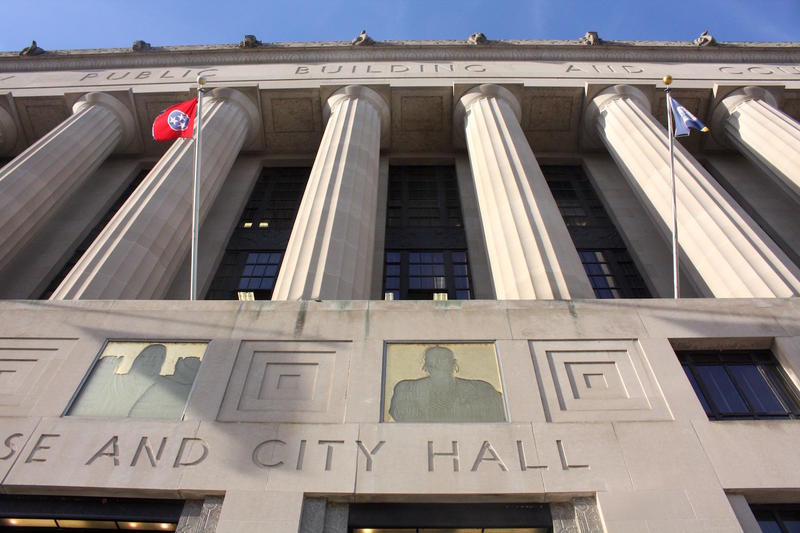
In Nashville’s final budget, residents will get more firefighters and paramedics, permanent curbside pickup at library branches and higher funding of public schools.
Without opposition, the Metro Council passed their $2.66 billion operating budget on Tuesday night to pay for daily operations of city services for the fiscal year that starts on July 1.
During this year’s budget discussions, the elephant in the room wasn’t bad finances, like last year. This time, it was two opposing ideas: a looming referendum that is attempting to restrain elected officials’ power, and a separate movement pushing for leaders to defund the police.
The latter failed for now. As for the referendum, a judge is expected to rule this week on whether to allow the special election to happen on July 27.
And in the meantime, the city’s healthier fiscal outlook made for a less dramatic budget season.
Police funding increases
The police will get 7.5% year-over-year boost, which will mostly go toward hiring 40 officers for the long-anticipated Southeast police precinct. It’ll be a part of an emergency response campus at the old K-Mart on Murfreesboro Pike.
It will serve a growing part of town that is racially diverse, with relatively high populations of Black, Hispanic and Asian residents.
“It gives you a sense of security having that police presence close by in the neighborhood where we have a quick response if you needed anything,” 18-year Forest Ridge resident John Keys says.
He tells WPLN News he does think there are “bad apples” within police departments across the country and in Nashville, but that better training and diversity could help.
In the same breath, he also has a desire for more quality of life amenities for Southeast Nashville. He suggests green space, a mall and more sit-down restaurants. It’s an important note that is often left out of conversations about Black people’s request for public safety.
City officials recognize that police are being asked to do many jobs, so Metro is funding a mental health co-response team to pair clinicians with officers on some dispatches. Meanwhile, councilmembers decided to hold off on funding a second type of crisis response, known as HEALS, which attempts to de-escalate mental health crisis calls without sending police officers. City officials said they don’t have everything in place to run it just yet.
City plays catch up with schools and department needs
Metro Nashville Public Schools will receive their full funding request. That money will go to a several things, including adding developmental workdays for support staff, reducing the student-to-psychologist ratio and adding elementary advocacy centers.
Historically Black North Nashville will also kick off pilots of the Cure Violence program — which hires former gang members or other people with street cred to work against gun violence — and a participatory budgeting process that allows residents to make decisions on infrastructure spending.
Nashville’s health department will add three new animal control positions; city employees will get a pay increase that was missed last year, and Metro Social Services will add two new employees for the Homeless Impact Division.
After the budget passed, the meeting moved on to other agenda items. But as Councilmember Brandon Taylor began to describe his agenda item, he was booed by members of the Nashville People’s Budget Coalition, Workers’ Dignity and other groups. They unsuccessfully demanded that councilmembers revisit the budget to spend more on affordable housing.
The city will put $12.5 million into the Barnes Housing Trust Fund, which funnels grants to developers who build affordable units, among other anticipated spending on housing.
Councilmember Brandon Taylor started speaking about an agenda item and then activists started booing. pic.twitter.com/pQMgtB6mcu
— ambriehl (@ambriehlc) June 16, 2021
From crisis to investment
Last year, there was a steep 34% property tax increase just to salvage a mostly status quo budget. The theme of this year’s budget was “investment,” reflecting a 180-degree turn for the city’s finances.
But city officials have a new hurdle ahead: fighting the political messaging tied to a referendum that is attempting to reduce the property tax rate and cap future increases.
While some have been sharply critical of Metro spending, other residents have voiced pent up frustration about city services not meeting expectations. Last year’s substantial tax increase — which many residents welcomed — still came just as residents were feeling the financial squeeze of the coronavirus pandemic.
This year’s budget discussion comes just after the city went through a property appraisal. That process means the city will bring in the same amount of tax money, but for individual property owners’ tax bills could rise or fall based on their specific property values.
The property tax rate for the General Services District will move down to $2.953 per $100 of assessed value; the slightly higher rate for the Urban Services District will be $3.288 per $100 of assessed value.
Meanwhile, if the referendum passes on July 27 and takes effect, it would prompt city leaders to make an immediate cut of $40 million.
When Mayor John Cooper was a councilmember, he often raised questions about how the city spent money and handled its assets. After being elected and the ensuing pandemic, he’s asking resident to trust him.
“If I was an early voice of being Paul Revere and saying, ‘We’re about to go off a cliff,’ that is not a bad thing,” he tells WPLN News. “That’s actually a qualification — that I saw the cliff and I did what I could to pull people back from it.”
During this budget process, there wasn’t the same level of shoulder tension in the room compared to last. No councilmember stepped in to offer an alternative spending plan that differed from Councilmember Kyzonté Toombs, who chairs the council’s budget and finance committee.
Update: This story has been updated to include a fuller summary of what resident John Keys would like to see prioritized for his neighborhood.

